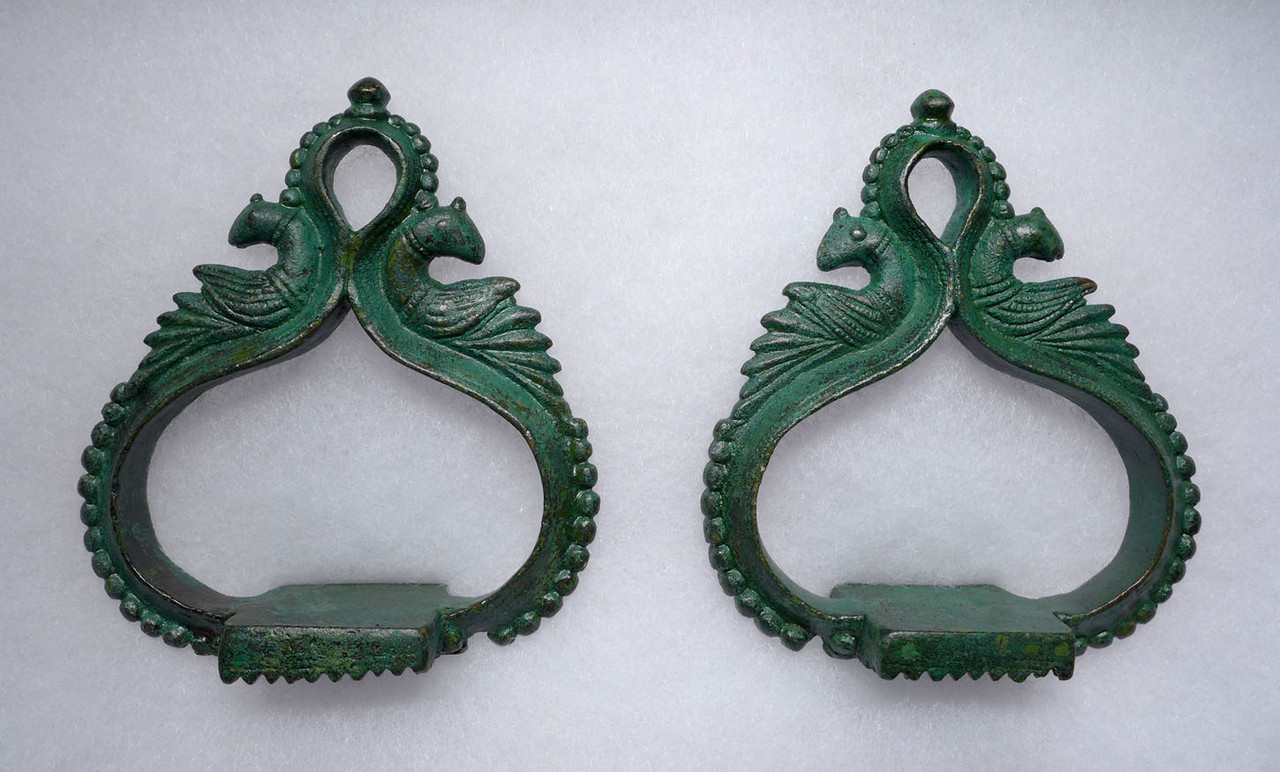Product Description
SEE MORE ANCIENT NEAR EASTERN ANTIQUITIES
These beautiful antique bronze horse stirrups come from the Deccani Indian culture of southern and central India. Each prominently features a pair of peacocks at the top, facing away to form a loop where a leather strap could fasten them to the horse saddle. The entire surface of the bronze has developed a wonderful lightly encrusted patina of bright green hues. The detail of the casting is superb in each stirrup of this wonderful pair.
HISTORY
The Deccanis or Deccani People are an ethnoreligious community of Urdu-speaking Muslims who inhabit, or trace their ancestry from, the Deccan region of Southern and Central India, and speak the Deccani dialect. The community traces its origins to the shifting of the Delhi Sultanate's capital from Delhi to Daulatabad in 1327 during the reign of Muhammad bin Tughluq. The migration of Hindavi-speaking people to the Deccan, and the conversion of local Hindus to Islam, led to the creation of a new community of Urdu-speaking Muslims, known as the Deccani, who would come to play an important role in the politics of the Deccan. Their language, Deccani Urdu, emerged as a language of linguistic prestige and culture during the Bahmani Sultanate, further evolving in the Deccan Sultanates.
Following the demise of the Bahmanis, the Deccan Sultanate period marked a golden age for Deccani culture, notably in the arts, language, and architecture. The Deccani people form the second largest ethnic group in the Deccan states of Maharashtra, Telangana, Andhra Pradesh, and Karnataka, and form a majority in the old cities of Hyderabad and Aurangabad. After the partition of British India and the annexation of Hyderabad, large diaspora communities formed outside the Deccan, especially in Pakistan, where they make up a significant portion of the Urdu speaking minority, the Muhajirs.
The word Deccani was derived in the court of Bahmani rulers in 1487 AD during Sultan Mahmood Shah Bahmani II. The Bahmanid empire was founded by Hasan Gangu, who was one of the inhabitants of Delhi who were forced to immigrate to Daulatabad in the during the Delhi Sultanate, with the purpose of building a large Muslim urban centre in the Deccan. These North Indian Urdu-speaking immigrants established an independent state, and eventually began adopting a distinct Deccani political identity.
Though few in number, the Deccanis became disproportionately powerful in the Tamil and Telugu country because they included the soldiers and service people who constituted the region's first sizeable Muslim political elite.
 US DOLLAR
US DOLLAR
 EURO
EURO
 AUSTRALIAN DOLLAR
AUSTRALIAN DOLLAR
 CANADIAN DOLLAR
CANADIAN DOLLAR
 POUND STERLING
POUND STERLING




















